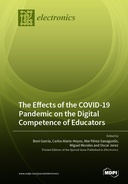Explore

The Effects of the COVID-19 Pandemic on the Digital Competence of Educators
0 Ungluers have
Faved this Work
Login to Fave
The Covid-19 pandemic is having an undeniable impact on all the statements of society. Regarding teaching and learning activities, most educational institutions suspended in-person instruction and moved to remote learning during the lockdown of March and April 2020. Although nowadays many countries have progressively re-opened their educational systems, blended learning is a common practice aimed to reduce the spread of the Covid-19 disease. This disruption has supposed an unprecedented acceleration to the digitalization of teaching and learning. Teaching professionals have been forced to develop their digital competence in a short amount of time, getting mastery in the management of information, the creation of audiovisual contents, and the use of technology to keep their students connected. This Special Issue presents contributions regarding the adoption of distance learning strategies, experiences, or lessons learned in this domain.
This book is included in DOAB.
Why read this book? Have your say.
You must be logged in to comment.
Rights Information
Are you the author or publisher of this work? If so, you can claim it as yours by registering as an Unglue.it rights holder.Downloads
This work has been downloaded 104 times via unglue.it ebook links.
- 104 - pdf (CC BY) at Unglue.it.
Keywords
- administrators
- Austria
- behavior intention
- breakout groups
- class loyalty
- Collaboration
- collaborative learning
- Competence
- computer-mediated communication
- convolution neural network
- cooperative competence
- COVID-19
- COVID-19 epidemic
- cross-curricular integration
- Decision-making
- Digital competence
- digital media implementation
- Digital storytelling
- distance learning
- E-learning
- Educational technology
- EFL
- Elementary Education
- face-to-face learning
- game-based learning
- general education
- graded reading
- group
- History of engineering & technology
- ICT
- interdisciplinary assignments
- KSA
- L2 learners
- learning algorithms
- learning media
- learning process
- mathematics education
- Mobile games
- mobile learning
- music art
- music subjects
- n/a
- online learning
- online participation
- Pandemic
- post-pandemic
- predictive validity
- proper implementations
- reading websites/applications
- relational coordination
- remote teaching
- Saudi Arabia
- scaffolding strategy
- school closures
- secondary school teachers
- social presence theory
- sociality
- soft skills
- spring 2020
- students’ utilization
- sustainability
- TAM
- TAM and TUT
- teacher–student relation
- teaching learning center (TLC)
- Technology
- Technology, engineering, agriculture
- Technology: general issues
- Translation
- un-professionalism
- university teachers
- Virtual Learning
- visual art
- visual art subjects
- well-structured questionnaires
- will–skill–tool model
Links
DOI: 10.3390/books978-3-0365-6461-6Editions

